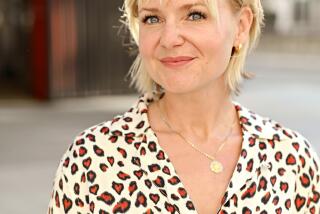Review: Hulu’s ‘Harlots’ gets down to business in 18th century London
In “Harlots,” an engaging new period melodrama that debuts Wednesday on Hulu, two whorehouses, unalike in dignity, go to war in 1763 London, ancient grudge breaking to new mutiny.
Samantha Morton plays Margaret Wells, a madam attempting to move up in her world, out of her low-rent Covent Garden digs into a new, bigger, brighter house in fashionable Soho. (Her circumstances are humble, but proper: “This is a decent bawdy house,” she tells a visitor.) Her well-connected rival, Lydia Quigley (Lesley Manville), rules that higher world, and for reasons certain to emerge in later episodes — I’ve seen two of eight — the two women are out, each in her own way to destroy the other.
If Margaret does not have a heart of gold, exactly, she does have a heart: She cares about the girls who work for her, and is concerned for the future of her daughters — celebrated Charlotte (Jessica Brown Findlay, Lady Sybil on “Downton Abbey”) and young Lucy (Eloise Smyth), whose virginity she is about to auction off by sealed bid, putting real-world value on what might otherwise be given away or, worse, stolen. “She’s as pure as the snow on St. Paul’s,” Margaret says by way of advertisement.
“Money is a woman’s only power in this world,” Margaret tells Charlotte, who is balking at becoming the legal property of the dopey aristocrat who keeps her in uptown splendor. (As to marriage, she “wouldn’t wish that on a dog.”)
“Thank you, Ma, for all you’ve done for Lucy and me,” Charlotte replies, not without irony. “You never, ever sold us short.”
She also has a what looks like a healthy, stable and equitable relationship — and a young son — with her lover and partner, William North (Daniel Sapani). That North is black is not, or not yet, significant within the series, but something a viewer is, I think, meant to find at least interesting.
If Margaret is not simple, Mrs. Quigley — there is no Mr. Quigley evident, apart from her awful blancmange of a son, played by Douggie McMeekin — is an obvious bad egg. The creamy pastel splendors of her house, with its tableaux vivants, harp music, and girls dressed like Greek nymphs or Georgian wedding cakes do not disguise the moral stench of her person. She indentures the women who work for her into virtual slavery, even as she gives them lessons in French and culture; she is not beyond contributing to the ruin of an innocent if the right person asks, at the right price.
Created by Moira Buffini and Alison Newman, an actress known for “EastEnders” and “Footballers’ Wives,” and made with a complement of female directors and writers, the series has a feminist edge. Prostitution was, indeed, a way for a woman to rise in a world, a fact even then noted in literature, in Daniel Defoe’s 1722 “Moll Flanders” and John Cleland’s 1748 “Memoirs of a Woman of Pleasure” (better known as “Fanny Hill”), bestsellers in their day.
At the same time, for all its social and political points, “Harlots” is also a galloping romance of a traditional sort — the tension between Mrs. Quigley and Margaret is akin to that between the rich ranchers and struggling sheepherders in an old western — a popular entertainment prettified far beyond what must have been the reality of the day. (It was a time in which, we’re told by title card, one in five women in London sold sex for a living.) In the usual way of the moving pictures, the prostitutes are all good-looking, to contemporary tastes; even the “fat one” included for variety is very pretty.
The men are not uniformly bad. Besides North, on the (seemingly) plus side, there is an old friend of Margaret’s, returned from the West Indies; and a young Irishman (Rory Fleck Byrne), a former sailor and current sedan-chair bearer — a taxi-driver, essentially — who falls in with Charlotte and has humor and charge and issues forth phrases like “a hunger in my stomach and a mouth full of breeze.” Other male roles here include amoral aristocrats, hypocritical clergymen, officious trolls and gormless boobs of a stock-company sort, and that they are not complicated is in keeping with the enterprise as a whole.
The premise, of course, promises sex, and there is sex — not all for money — but not a particular lot by premium cable or streaming service standards. There is an abundance of decolletage, but nudity, from what I’ve seen, is limited to a smidgen of toplessness and a smattering of bare bottom — female and male and, in the second instance, seemingly by intention, not necessarily pleasing to behold.
‘Harlots’
Where: Hulu
When: Anytime, starting Wednesday
Rating: TV-14 (may be unsuitable for children under the age of 14 with advisories for suggestive dialogue and sex)
Follow Robert Lloyd on Twitter @LATimesTVLloyd
ALSO
Hulu’s ‘Harlots’ challenges the typical TV depiction of prostitutes as nameless sidekicks or props
More to Read
The complete guide to home viewing
Get Screen Gab for everything about the TV shows and streaming movies everyone’s talking about.
You may occasionally receive promotional content from the Los Angeles Times.







